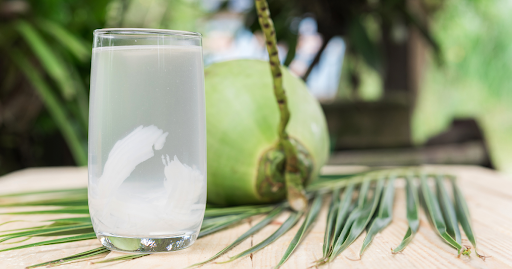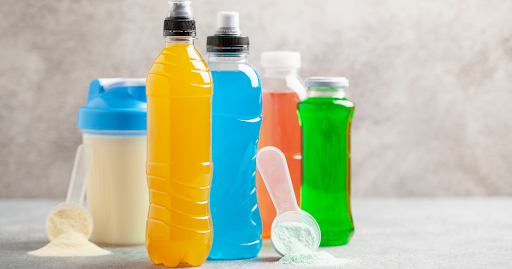

Hey, fitness enthusiasts! Are you tired of plain old water during your workouts? If so, you’ve probably heard the buzz about the benefits of coconut water and sports drinks. But which one is better for you? Let’s settle this once and for all!
For good reason, coconut water has been hailed as nature’s sports drink. It’s slightly sweet and has a nutty flavour, with a refreshing taste that beats sugary juices any day. But did you know it also has proven health benefits? Drinking coconut water regularly can help manage blood sugar levels, lower blood pressure, and even prevent kidney stone formation. Plus, it’s a natural source of electrolytes, making it a great option for staying hydrated during your workouts.
On the other hand, sports drinks are specifically designed to support hydration and electrolyte balance during intense physical activity. They often contain added sugar and calories, which can be beneficial for athletes who need to refuel quickly. However, they’re not always the best option for everyone, especially those with kidney disease or trying to maintain a balanced diet.
In this article, we’ll dive deep into the world of coconut water and sports drinks, examining their ingredients, intended use, and the scientific evidence supporting their health benefits. So whether you’re a seasoned athlete or just someone looking to make smarter hydration choices, join us as we explore the pros and cons of these popular drinks and help you decide which one is the perfect match for your active lifestyle.
WHY SHOULD I DRINK COCONUT WATER FOR HEALTH BENEFITS?


One of the most notable health benefits of drinking coconut water is its ability to regulate blood pressure. Coconut water is rich in potassium, which helps to counteract the effects of sodium and lower blood pressure levels. Additionally, it can help prevent kidney stones due to its ability to increase urine flow and dilute urine.
Compared to plain water, coconut water also contains more potassium and fewer calories. It is a great alternative to sports drinks which are often packed with added sugars and unnecessary calories. Coconut water also has natural electrolytes that can help replenish lost fluids and minerals during and after physical activities.
Coconut water is not just a source of hydration, but it is also rich in antioxidants and vitamin C, which can boost your immune system and protect your skin from damage caused by too many free radicals. It has been used as an ancient medicinal herb in traditional medicine and is known to have anti-inflammatory and anti-aging properties.
Coconut water has many health benefits that make it a popular choice for many health-conscious individuals. In the next section, we will delve deeper into the differences and benefits of coconut water and sports drinks, so stay tuned!
COCONUT WATER VS SPORTS DRINKS: UNRAVELLING THE HYDRATION MYSTERY


When it comes to quenching your thirst and replenishing those lost electrolytes after a workout, the battle between coconut water and sports drinks is a hot topic. Although both options are popular among athletes and fitness enthusiasts, it’s important to understand their key differences to make an informed decision that suits your personal needs and preferences.
Coconut water, sourced from the refreshing heart of young, green coconuts, has become a beloved natural alternative to sports drinks. It’s packed with essential nutrients like potassium, magnesium, and calcium, all of which are crucial for maintaining a balanced electrolyte profile. With its lower sugar and calorie content, coconut water has a clear advantage for those monitoring their sugar intake or searching for a healthier hydration option.
In contrast, sports drinks are tailor-made to restore the body’s fluids, electrolytes, and energy after demanding physical activities. These drinks typically blend water, electrolytes (such as sodium and potassium), and carbohydrates (often in the form of sugars) to supply a quick energy boost. Although sports drinks tend to be higher in sugar, this can actually be a plus during intense endurance events or high-intensity workouts, when your body craves an immediate source of fuel.
In a nutshell, the primary distinctions between coconut water and sports drinks revolve around their ingredients, sugar and calorie content, and intended use. Coconut water brings a natural, nutrient-dense alternative with fewer sugars and calories to the table, while sports drinks offer a more focused solution for restoring lost fluids, electrolytes, and energy during intense physical exertion.
As we explore the ingredients and intended use of both beverages in the upcoming sections, along with the scientific evidence supporting the benefits of coconut water and its health claims, you’ll be better equipped to make the perfect hydration choice for your active lifestyle.
UNCOVERING THE SCIENCE BEHIND COCONUT WATER AND SPORTS DRINKS: HYDRATION AND ELECTROLYTE BALANCE.
Coconut water has received considerable attention in recent years, with studies highlighting its potential as a natural hydration source. Research has shown that coconut water is effective in restoring hydration and electrolyte balance after exercise, owing to its rich potassium content and isotonic nature (Kalman et al., 2012). However, it’s worth noting that coconut water tends to be lower in sodium, a key electrolyte lost through sweat during intense physical activities.
Sports drinks, specifically formulated for athletic performance, have been widely studied for their hydration and electrolyte replenishment capabilities. In endurance events, sports drinks have been found to maintain hydration levels better than water alone, thanks to their sodium content, which promotes fluid retention and reduces urine output (Sawka et al., 2007). Additionally, the carbohydrates in sports drinks provide an energy boost, enhancing performance in prolonged, high-intensity activities (Currell & Jeukendrup, 2008).
It’s important to acknowledge that individual preferences and tolerability play a significant role in choosing a hydration beverage. Some studies suggest that the taste and palatability of sports drinks may encourage athletes to drink more, thereby promoting better hydration (Maughan et al., 1997). But for those seeking a more natural option, the mildly sweet taste of coconut water may be preferable.
Overall, scientific evidence supports the benefits of both coconut water and sports drinks in different scenarios. Coconut water serves as a viable option for mild to moderate hydration needs, while sports drinks cater to more intense activities, offering a rapid energy boost and superior sodium replenishment. Ultimately, the choice depends on your workout intensity, personal health goals, and taste preferences.
DECIDING BETWEEN COCONUT WATER ANDS SPORTS DRINKS: FACTORS TO CONSIDER
Now that we’ve delved into the key differences between coconut water and sports drinks, it’s time to help you decide which option is best suited to your specific needs and preferences. In this section, we’ll provide some practical tips to guide you in making the right choice based on your unique circumstances.
Workout Intensity and Duration
Your choice of hydration solution should take into account the nature of your physical activity. For light to moderate workouts, coconut water can be an excellent choice to rehydrate and replenish electrolytes. However, if you’re engaging in high-intensity or long-lasting exercises, sports drinks may be more appropriate due to their quick energy supply and superior sodium replacement, which are crucial for peak performance.
Health Goals and Dietary Considerations
If you’re looking for a natural, low-calorie option with minimal additives, drinking coconut water is the way to go. It’s ideal for those adhering to clean eating principles or trying to avoid artificial ingredients. On the other hand, sports drinks might be better suited for athletes in need of a carbohydrate boost during their training sessions.
Taste Preferences
The flavour of your hydration solution can impact how likely you are to drink it. Coconut water has a subtle, sweet taste that many find refreshing, while sports drinks come in a variety of flavours and levels of sweetness. Opt for a beverage that suits your taste buds, as this will encourage you to stay hydrated during your workouts.
Budget and Accessibility
The cost and availability of coconut water and sports drinks can vary. While sports drinks are generally more accessible and often more affordable, coconut water is becoming increasingly popular and easier to find. Keep your budget and the convenience of obtaining your preferred hydration option in mind.
Personal Tolerance
Some people might experience digestive issues from certain ingredients in sports drinks, such as artificial sweeteners or high sugar content. If this is the case for you, the more natural composition of either coconut milk or water may be a better alternative.
Deciding between coconut water and sports drinks depends on a range of factors, including your workout intensity, health goals, taste preferences, budget, and personal tolerability. By taking these aspects into consideration, you can make an informed decision about consuming coconut water as the most appropriate hydration solution to support your active lifestyle. Stay hydrated and keep striving towards your fitness goals!
At Kelly’s Distributors, we stock a wide variety of coconut waters packed with essential electrolytes, vitamins, and minerals that will keep you hydrated during and after your workouts. We also offer a variety of sports drinks to help you power through your training sessions.
